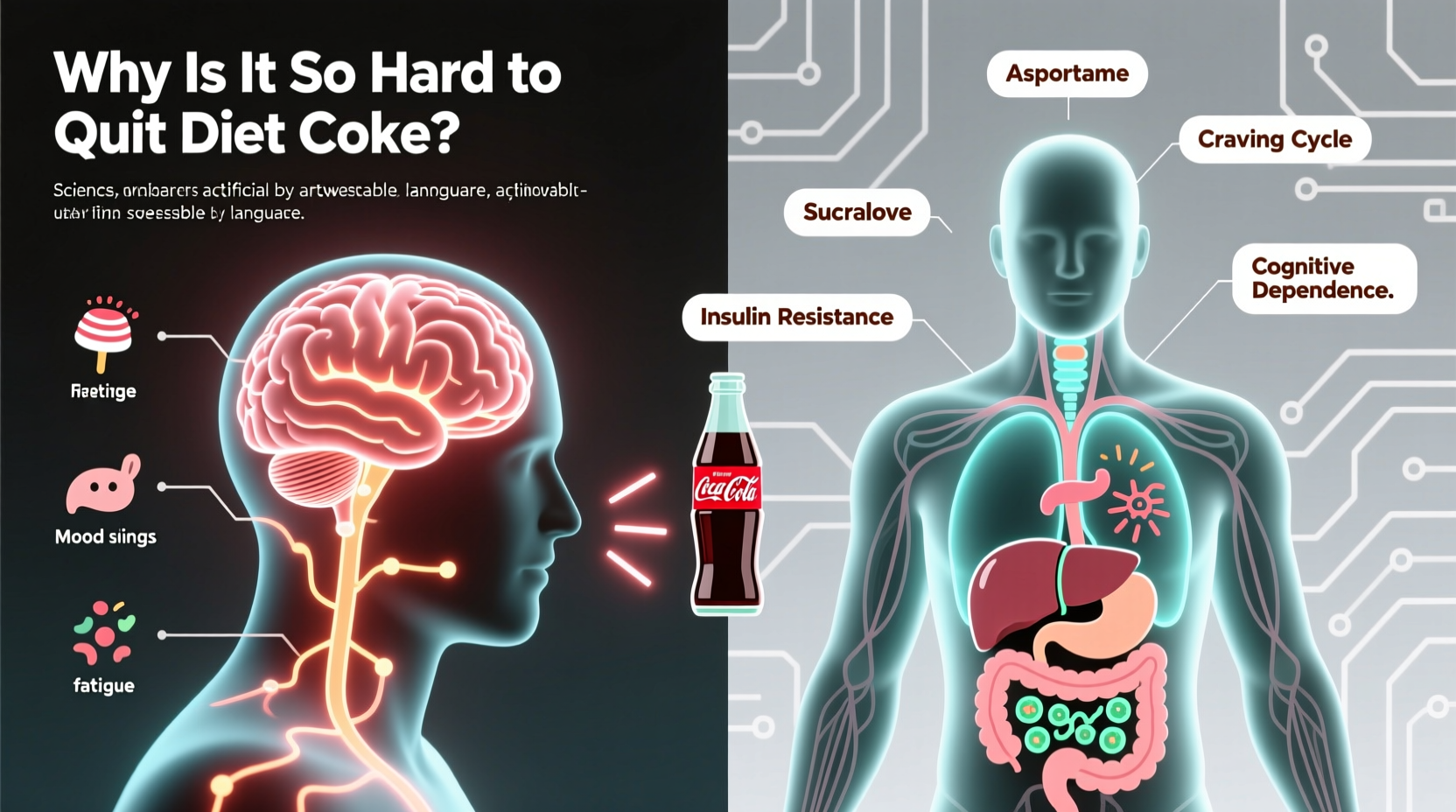For millions of people, cracking open a can of Diet Coke is more than a habit—it’s a ritual. It’s the morning pick-me-up, the mid-afternoon reset, or the substitute for dessert after dinner. Despite containing no sugar and minimal calories, Diet Coke can be just as addictive as its sugary counterpart. The irony? Many turn to it to improve their health, only to find themselves trapped in a cycle they can’t seem to escape. So why is diet coke addiction so hard to quit? The answer lies in a complex interplay of neurochemistry, psychology, and behavioral conditioning.
The Science Behind the Craving

Diet Coke may not contain sugar, but it still hijacks the brain’s reward system. Artificial sweeteners like aspartame, sucralose, and acesulfame potassium activate sweet taste receptors on the tongue, sending signals to the brain that expect a caloric payoff. When that payoff doesn’t come, the brain registers a kind of “sweetness betrayal,” which can lead to increased cravings for real sugar or more artificially sweetened drinks.
Meanwhile, caffeine—a central nervous system stimulant—plays a major role. Most cans of Diet Coke contain around 46 mg of caffeine. Regular consumption leads to physical dependence: the brain adapts by increasing adenosine receptors, making you feel sluggish without your usual intake. This builds tolerance, requiring more soda to achieve the same alertness, and withdrawal symptoms like headaches, irritability, and fatigue when you stop.
“Caffeine is one of the most widely used psychoactive substances in the world. Its effects on dopamine and adenosine make it highly reinforcing, especially when paired with habitual behaviors.” — Dr. Laura Chen, Neuroscientist and Addiction Researcher
Psychological Triggers and Behavioral Loops
What makes Diet Coke particularly sticky as a habit is how seamlessly it integrates into daily routines. The brain thrives on predictability. Drinking a Diet Coke at your desk every afternoon becomes a conditioned response—cued by time, location, or emotional state. Over time, these cues become automatic triggers, independent of actual thirst or energy needs.
Moreover, many people use Diet Coke as a coping mechanism. It provides a moment of pause, a small indulgence without guilt—especially appealing to those trying to lose weight or manage diabetes. But this perceived “guilt-free” status reinforces continued use, even when consumption spirals into excess.
Breaking Down the Barriers to Quitting
Quitting Diet Coke isn’t just about willpower. It’s about overcoming deeply embedded neural pathways. Here are the main reasons people struggle:
- Caffeine dependence: Withdrawal symptoms can last 2–9 days and include headaches, fatigue, mood swings, and difficulty concentrating.
- Taste memory: The brain remembers the pleasurable sensation of sweetness and carbonation, creating strong cravings.
- Habit strength: If you’ve been drinking multiple cans daily for years, the behavior is deeply encoded in your subconscious.
- Misguided perception: Because it’s low-calorie, many don’t view it as harmful, delaying intervention until health issues arise.
- Lack of replacement strategy: Simply stopping without a substitute often leads to relapse.
Real-Life Example: Sarah’s Journey Off Diet Coke
Sarah, a 38-year-old project manager, drank 4–5 cans of Diet Coke daily for over a decade. She started using it to stay alert during long workdays and appreciated that it didn’t add calories. But she began noticing chronic headaches, insomnia, and anxiety. After her doctor linked her symptoms to excessive caffeine and artificial sweeteners, she tried quitting cold turkey. Within two days, she had a migraine and called in sick. Discouraged, she went back to her old habit.
On her second attempt, she adopted a gradual tapering method, replaced afternoon cans with herbal tea, and used a hydration tracker app. She also practiced mindfulness when cravings hit. By week six, she was completely off Diet Coke. Her sleep improved, anxiety decreased, and she reported feeling more emotionally balanced.
Step-by-Step Guide to Quitting Diet Coke
Going cold turkey rarely works for habitual users. A structured, compassionate approach yields better long-term results. Follow this timeline to reduce dependency safely:
- Week 1: Track and Assess
Record every can you drink, noting time, mood, and trigger. This builds awareness and identifies patterns. - Week 2: Begin Dilution
Mix half Diet Coke with half sparkling water. This reduces caffeine and sweetness gradually while maintaining carbonation satisfaction. - Week 3–4: Replace Strategically
Swap one can per day with a healthier alternative—unsweetened iced tea, flavored seltzer (without artificial sweeteners), or infused water. - Week 5–6: Eliminate One at a Time
Aim to cut out one can every three days. Use distraction techniques (e.g., chewing gum, walking) when cravings strike. - Week 7+: Maintain and Reward
Once fully off, celebrate milestones. Reinvest the money saved into something meaningful—this reinforces positive change.
Do’s and Don’ts When Quitting Diet Coke
| Do’s | Don’ts |
|---|---|
| Stay hydrated with water, herbal teas, or electrolyte drinks | Replace Diet Coke with energy drinks or high-caffeine alternatives |
| Use natural flavor enhancers like lemon, cucumber, or mint in water | Try to quit during periods of high stress or major life changes |
| Get adequate sleep to reduce reliance on caffeine | Ignore withdrawal symptoms—address them with rest and pain relief if needed |
| Seek support from friends or online communities | Beat yourself up over a slip-up—relapse is part of the process |
Frequently Asked Questions
Is Diet Coke worse than regular soda?
Not necessarily in terms of calories, but both carry risks. Regular soda contributes to obesity and insulin resistance due to high sugar content. Diet Coke avoids sugar but may disrupt gut microbiota, increase appetite, and contribute to metabolic syndrome over time. Neither should be consumed in excess.
Can artificial sweeteners cause addiction?
While not addictive in the classical drug-dependent sense, artificial sweeteners can condition the brain to crave sweet tastes. Studies show they may alter dopamine signaling and promote overeating by decoupling sweetness from satiety.
How long do withdrawal symptoms last?
Caffeine withdrawal typically peaks within 24–48 hours and subsides within a week. Headaches, fatigue, irritability, and brain fog are common. Staying hydrated, resting, and using over-the-counter pain relief can help manage symptoms.
Practical Checklist to Break Free
- ✅ Track your current Diet Coke consumption for 3 days
- ✅ Identify your top 3 triggers (e.g., afternoon slump, driving, post-meal)
- ✅ Choose 2–3 healthy substitutes (e.g., hibiscus tea, sparkling water with fruit)
- ✅ Set a start date for tapering (avoid busy or stressful weeks)
- ✅ Inform a friend or family member for accountability
- ✅ Plan distractions for high-craving moments (walk, stretch, meditate)
- ✅ Celebrate each week without Diet Coke
Conclusion: Taking Back Control
Breaking free from Diet Coke isn’t just about ditching a drink—it’s about reclaiming autonomy over your habits. The addiction isn’t a personal failing; it’s the result of powerful biological and environmental forces working in tandem. But with awareness, strategy, and self-compassion, it’s entirely possible to reset your relationship with caffeine and sweetness.
Every person who quits adds years to their life and clarity to their mind. You don’t have to be perfect—just persistent. Start small, honor your progress, and remember: the first sip of freedom tastes even better than the last can of Diet Coke.









 浙公网安备
33010002000092号
浙公网安备
33010002000092号 浙B2-20120091-4
浙B2-20120091-4
Comments
No comments yet. Why don't you start the discussion?